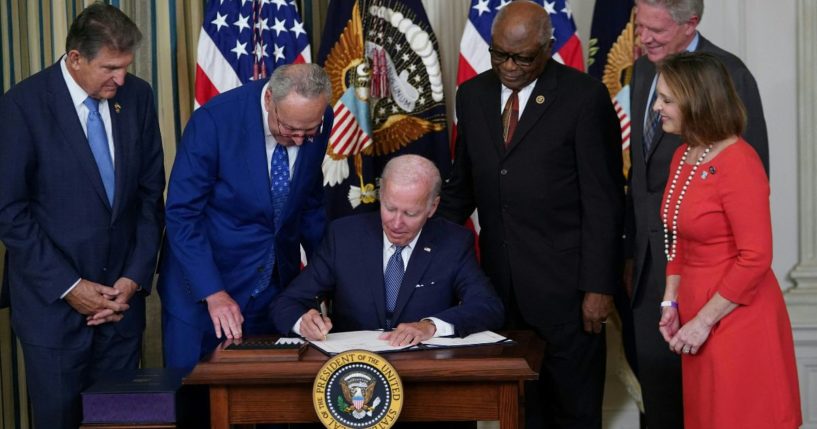
Op-Ed: The So-Called Inflation Reduction Act Is the Problem, Not the Solution
A central pillar of the just-passed Inflation Reduction Act is $80 billion going to the IRS to hire some 87,000 new agents, doubling the current force, to chase down U.S. taxpayers who allegedly are not meeting their tax obligations.
The rationale is that we have a large national budget deficit — that is, the government is bringing in less money than it spends — so a larger army of IRS agents running after tax deadbeats will help solve our nation’s fiscal problems.
But in this same new law in which U.S. taxpayers are asked to spend $80 billion to hire more IRS agents to shake down their neighbors who are supposedly not paying their fair share, there is $430 billion in new government spending, a large portion of which is earmarked for “green” energy projects of various shapes and forms.
At the same time that we’re expanding our army of tax collectors, we continue to expand government and spending at an even faster pace.
The Congressional Budget Office has just released its latest long-term budget outlook, and here we get a broader picture of the problem.
According to the report, “from 1972 to 2021, total federal outlays averaged 21% of GDP; over 2022-2052 period, such outlays are projected to average 26% of GDP.” CBO projects that the government will take on average 5 percent more from our national economy in the next 30 years than it did on average over the last 50 years.
Looking at our GDP in 2022 — roughly $25 trillion — at 26 percent of GDP, government spending will be over $1 trillion more than it would have been at 21 percent.
So, $1 trillion more in spending on average per year, with another 87,000 IRS agents helping raise money to finance the ongoing expansion of government and its increasing control over the lives of Americans.
Why, as someone whose business is trying to improve the lives of low-income Americans, do I care about this?
Turning forward in the CBO report, we get to the really shocking information.
From 1992 to 2021, the U.S. economy grew 2.4 percent per year on average. CBO projects that from 2022 to 2052, the average growth of the U.S. economy will be 1.7 percent per year.
This should shock every American, and it’s getting hardly any attention.
The more our national economy is controlled by government and politicians, the more sluggish the growth of our economy will be.
It stands to reason. Growth comes from entrepreneurs, work, creativity. More government means less of all these things.
Slower growth means lower income and less opportunity.
Anyone who cares about helping those who want to get ahead in America should be cheering for faster growth and less government rather than more government and slower growth.
Hoover Institution economist John Cochrane has pointed out that from 1950 to 2000, the U.S. economy grew at 3.5 percent per year. Real income per person went from $16,000 in 1950 to $50,000 in 2000. If the economy grew from 1950 to 2000 at 2 percent instead of 3.5 percent, income in 2000 would have risen to just $23,000.
It’s why, as someone who cares about helping low-income Americans improve their lot, I care about a growing, dynamic economy, not a bloated, sclerotic economy controlled by politicians.
The so-called Inflation Reduction Act takes matters in the exact opposite direction of where we should be going. Pretending to care about the nation’s fiscal imbalances while adding $430 billion in new spending, all of it driven and defined by Washington special interests, is the problem, not the solution.
© 2022 CREATORS.COM
The views expressed in this opinion article are those of their author and are not necessarily either shared or endorsed by the owners of this website. If you are interested in contributing an Op-Ed to The Western Journal, you can learn about our submission guidelines and process here.
Truth and Accuracy
We are committed to truth and accuracy in all of our journalism. Read our editorial standards.
Advertise with The Western Journal and reach millions of highly engaged readers, while supporting our work. Advertise Today.












